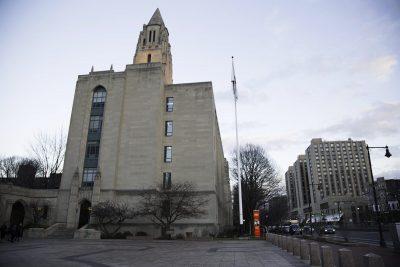By Juncheng Quan and Rachel Do

Boston University delivered acceptance letters March 27 to 18.3% of nearly 76,000 applicants — a record-breaking number of students. With a Fall 2020 acceptance rate of 18.5%, the newest class follows a year-on-year decline in the University’s admission rates.
Kelly Walter, the dean of undergraduate admissions and associate vice president for enrollment, said admissions at BU has become increasingly competitive in the last decade — the rate decreased from 46% in 2012, to 29% in 2016 and now to 18%.
Walter said when the admissions rate is decreasing, it means the university is improving — highly selective universities in the country are those with the lowest admissions rates.
“It’s about the competition for admission,” Walter said. “As more and more students apply, of course the admit rate goes down. We’re not in a position to admit additional students.”
COVID-19 restrictions, such as reduced campus visits, have made the choice to attend BU in 2021 an unprecedented challenge for new Terriers.
Jasmine Freij, an incoming College of Arts and Sciences freshman hoping to study psychology, said applications were unusual for her class year, given her limited exposure to the Charles River Campus.
“We didn’t really do as many tours in person, so that definitely changed the application process,” Freij said. “The process was definitely different.”
An additional struggle Freij said she faced was the lack of access to her high school’s resources — a result of the pandemic.
“Just being not in school,” she said, “and not really being able to talk to my guidance counselor that much.”
Christine Chu, a former assistant director of undergraduate admissions at Georgetown University and Yale University and a counselor at IvyWise — a company that provides college advising services to high schoolers — noted two major changes in the admissions process.
The first change, she wrote in an email, revolved around the pandemic’s effect on travel restrictions.
“With campuses closed and travel on pause, the college search process became virtual – tours, admissions presentations, high school visits,” Chu wrote.
The other difference, she wrote, has been the fewer standardized testing requirements at many schools during the pandemic — Chu noted more than 1,370 institutions have made standardized tests optional for applications.
BU is one such institution, going testing optional for applicants applying for entry this Fall through Spring 2023.
Walter said there is “absolutely no doubt” the loosened application requirements influenced a large number of students to apply to BU this year, but that increase in applicants was “much larger” than expected.
“It meant that a huge barrier was removed for students as they thought about a college that would be a good fit for them,” Walter said. “That also contributed to the 24% increase in applications.”
The rise in applications, Walter said, also helps correct the misconception that standardized test scores significantly affect chances of admission.
She added BU has “always practiced holistic admissions” and prioritized high school coursework, not standardized testing scores.
“In some ways, the way we’re reviewing applications is no different than the way we reviewed them before,” Walter said. “We’ve removed one piece of information, an SAT or an ACT, but we can still make a very thoughtful and well-informed decision.”
Ally Li, an incoming freshman in the Questrom School of Business, said she didn’t submit her SAT scores because she was unhappy with her results. Instead, Li said she focused on her extracurriculars in her application, though she is not sure what exactly solidified her acceptance.
“Honestly, I’m kind of bamboozled about how I got in,” she said. “The acceptance rate was really low.”
For her highlighted extracurriculars, Li said she has been selling jewelry on Depop — a second-hand clothing marketplace — for the last two years, tutoring after school and playing on the handball team in high school. She said these activities, as opposed to academics, might have helped her application stand out among others.
Li said applying to BU was “quite simple” compared to other competitive schools, and she didn’t feel overwhelmed by emails.
“It was pretty competitive,” she said, “but I didn’t really pay mind to it.”
Given that BU has extended the test-optional policy for another year, Walter said, applicants for Fall 2022 will be able to decide whether to submit standardized tests moving forward.
She noted that optional standardized testing may become a permanent fixture at more prestigious colleges.
“This is not a math formula where we put in a GPA or a test score and the algorithm tells us whether you will be successful at BU,” Walter said. “That’s not how the admissions process works.”
She said the admissions office was focused far more on the applicants as individuals and how they would fit at BU.
“It’s much more of a human process where we’re obviously asking ourselves the important question, which is will the student be successful academically?” Walter said. “But there’s a second question that’s equally important: How will this student contribute to the Boston University community?”

























































































































BU Parents United • Apr 7, 2021 at 6:40 pm
Welcome to all the new terriers! Have your parents join us at BU Parents United!